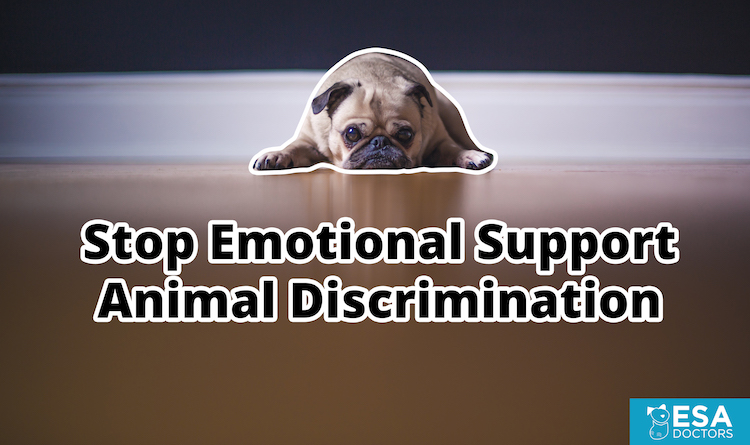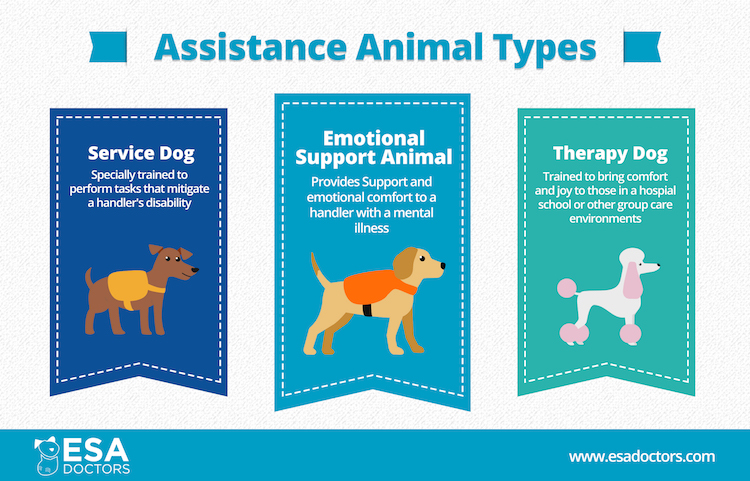Emotional Support Animals are not considered pets. Emotional Support Animals are also not Service Animals. Emotional Support Animals are a specific type of assistance animal that are protected and granted housing access under the Fair Housing Act. This means Emotional Support Animals have the right to live with their owners in no-pet apartments, co-ops, and condos across America.

Emotional Support Animals are exempt from buildings with no-pet policies across the US
If your client is looking to rent or purchase an apartment and are considering housing accommodations with no-pet policies, they may be exempt from those rules if their pet qualifies as an ESA. To see if your client qualifies for an ESA letter, they can start by completing the ESA Questionnaire in the link below and start working with a mental health professional licensed for your state.

9 Things Real Estate Professionals Should Know About Emotional Support Animals
- Emotional Support Animals (ESA) have access to ‘no-pet’ housing for apartments, condos, HOA’s, and yes, even New York co-ops
- To qualify an existing pet as a legitimate ESA, the owner must qualify for an ESA letter from a Licensed Mental Health Professional (LMHP). You can find an LMHP familiar with ESAs online via ESA Doctors
- To prevent discrimination, a renter or buyer does not need to disclose to the Co-op, HOA, or apartment complex prior to signing paperwork i.e. purchase contract, leasing agreement, etc. that they have a disability that requires an ESA
- A landlord, HOA, or Co-op board cannot deny an Emotional Support Animal due to their weight, age, or breed
- A landlord, HOA, or Co-op Board can deny reasonable accommodations if the ESA poses a threat or creates an undue burden
- A landlord cannot deny an ESA’s breed even if insurance costs go up without direct approval from HUD
- Although landlords, HOA’s, or Co-op boards cannot charge separate pet fees, they can charge the ESA owner for damages
- Emotional Support Animals (ESA) are not required to have special training, unlike Service Dogs
- There are some limited situations under the Fair Housing Act where landlords do not have to allow ESAs
Every Real Estate Broker should be familiar with regulations protecting Emotional Support Animals so they can help support their clients with ESAs, particularly when it comes to HOA’s, condos, and co-op board approvals.
1. Emotional Support Animals have access to ‘no-pet’ housing, and yes, this even includes co-ops

Emotional Support Animals are protected by federal law, which means that the rules under the Fair Housing Act (FHA) also apply in your state. Each state also has its own rules relating to emotional support animals which are generally similar to what the FHA provides.
Emotional Support Animals are protected under the Fair Housing Act which co-ops are still accountable to.
Under FHA rules, an Emotional Support Animal is NOT considered a pet and therefore a building’s policy regarding pets does not apply to them.
2. To make a pet a legitimate Emotional Support Animal, the pet owner must qualify for an ESA letter written by a Mental Health Professional

To make a pet an Emotional Support Animal, you must qualify for an ESA letter from a Licensed Mental Health Professional. If you are currently in therapy and working regularly with a therapist, you can see if your therapist is able to write an ESA letter for you. We will outline how you can get an ESA letter through an online company in the next section if your therapist is unable to write an ESA letter or if you do not have a therapist.
ESA Registrations do not properly qualify an ESA, you need an ESA letter from a licensed mental health professional.

With Streeteasy, Zillow, and Instacart transforming how people look for apartments, it’s likely no surprise to you that there are technology companies that can help people with their emotional and mental disabilities. Clients that work with ESA Doctors are paired with licensed mental health professionals who are well versed in ESA regulations and understand the benefits of having an ESA for mental health.
You are able to qualify for an ESA letter online if you are working with the LMHP directly.
ESA Doctors is a technology company that uses its proprietary platform to help connect people who need an ESA Letter with real and licensed mental health professionals. The process to qualify for an ESA letter online is simple.
Step 1 – Complete the form below –
Step 2 – ESA Doctors will help pair you with an LMHP
Step 3 – The LMHP will contact you directly with the next steps and will complete your assessment as they see fit
ESA Doctors does not directly issue ESA letters and cannot influence the decision of the LMHP. You should be cautious of companies that directly sell ESA letters to you. Remember, an ESA recommendation letter must come from a licensed mental health professional.
3. To prevent discrimination, a renter or buyer does not have to disclose their disability to the Co-op, HOA, or apartment complex prior to signing contracts or leasing agreements

Even if a housing provider has a no-dog or no-cat policy, if you qualify for an ESA letter, you can request reasonable accommodation for your Emotional Support Animal from them. We recommend that renters, buyers and brokers familiarize themselves with Fair Housing Act rules and understand what rights tenants have when it comes to ESAs.
Housing providers can be held liable if they are found to have violated federal law by unjustly discriminating against a tenant with a valid Emotional Support Animal.
Co-ops, like other housing providers, are subject to the rules of the Fair Housing Act and the Department of Housing’s oversight.
4. A landlord, HOA, or Co-op board cannot deny an Emotional Support Animal due to their weight or breed

Since co-ops are run by shareholders of the building, there may be a chance they are not familiar with Fair Housing rules and may unintentionally discriminate against your disability and Emotional Support Animal.
Housing providers cannot impose weight, breed or size restrictions on Emotional Support Animals even though regular pets may face such restrictions under normal building policy.
Emotional Support Animals are allowed in tenant common areas, and the housing provider must also accommodate any visitors that may have their own Emotional Support Animal.
5. A landlord, HOA, or Co-op Board can deny reasonable accommodations if the ESA poses a threat or creates an unreasonable burden

A landlord can reject an Emotional Support Animal in certain specific situations. Some examples include:
- ESA poses a threat to the health and safety of others
- Causes an undue financial burden on the housing provider
- Damages property
6. A landlord cannot deny an ESA based on breed even if insurance costs go up; without direct approval from HUD

If housing insurance goes up substantially for a housing provider, this may be a reasonable cause for denying access to the ESA since it can be considered an undue financial burden. However, this does not mean the housing provide can simply state “it’s too expensive”. If a housing provider wants to deny the reasonable accommodation request, they must go through the denial process directly with HUD.
7. Landlords, HOA’s, or Co-op boards cannot charge separate pet fees, but they can charge the ESA owner for any damages

Although the housing provider cannot charge an extra pet fee or request additional security deposits for the ESA, the owner is fully responsible for the actions, behavior, and damages of the ESA.
If the ESA damages the property beyond standard wear and tear the owner is fully liable for paying the housing provider for the damages.
8. Emotional Support Animals are not required to have special training, they are used to provide love and comfort to their owners

Unlike Service Dogs, Emotional Support Animals do not require special training and do not need to provide a task to aid a specific disability.
Although Service Dog handlers often have their Service Dogs wear a vest, an ESA vest is not required for an ESA since they do not have public access rights.
You may decide to voluntarily order an ESA vest or an ESA ID card if you prefer but know that it is not required. These are all optional tools you may find helpful, but keep in mind that unless you have an ESA letter from an LMHP, your pet is still an ordinary pet even with these items.
It is also important to note that registrations and registries of Emotional Support Animals are not required or recognized for ESAs under the Fair Housing Act. Registration is neither necessary nor effective in making a pet a real Emotional Support Animal.
9. Emotional Support Animals are not protected under a few circumstances
The requirements regarding ESAs under the Fair Housing Act do not apply if the housing provider is:
- An owner-occupied building with no more than four units or
- A single-family home sold or rented by the owner without the use of an agent







Hi quick question and thanks in advance!
I’m looking to rent a townhouse/condo
They are using a real estate agent to vet potential renters. I read something in here about ESA being denied if brokers are used. Can you please clarify?
What you might be thinking of is the exemption from ESA rules for single-family houses sold or rented by the owner without the use of an agent.
If a subdivision hoa says 2
Dog limit and can you have 2 dogs plus an ESA? What about 3 ESAs?
There is no HUD guidance directly on this point but the general understanding is that ESAs do not count towards the pet limit since they are not considered pets.
I own a condo in myrtle beach at sands ocean club. When I purchased my condo I gave them my esa certification and a letter from therapist. They are now saying when I go to my condo I can not bring my esa. Is this possible for them to do or can I continue to take my esa.
If your condo association is saying that your ESA is prohibited from being in common areas where other tenants are allowed, that is probably not allowed. The purpose of the Fair Housing Act’s rules regarding ESAs is to allow tenants with disabilities to enjoy the premises to the same degree as the non-disabled. It would be discriminatory to ban you from certain areas where other tenants are allowed just because you have an ESA.
I have a couple of questions. First, you claim that we can’t discriminate by breed or weight. It sounds like you’re only referring to dogs and cats and not addressing things like snakes and rats. What’s the scoop on that?
You also mentioned that you do not need to have a vest for an Esa because they don’t have Public Access rights. Is that true? Could you explain public rights?
Is it true landlords do not need to rent a single-family home to someone with an Esa with proper paperwork?
And holy cow! It certainly seems unfair to me that full disclosure isn’t necessary before lease signing. Comments?
And a couple questions I’ve been wondering about for a long time and have discussed it with other landlords. It seems awful funny that landlords have to allow esa’s in our buildings with no compensation with a real possibility of damages – while the makers of food and veterinarians are not required to provide their services for free. Actually, it’s not funny at all… We have suffered quite a monetary loss renting do people with esa’s.
And last but not least – what is the policy about esa’s being properly vetted & insured. Can we require the owners to provide us with proof of current vetting, spaying and neutering? Can we require them to have renter’s insurance? Can we require them to have the animal named on their policy?
These are things that we all need to know. As landlords, we get so many conflicting answers from every agency we talked to. Help!
1. Landlords cannot discriminate against specific breeds but they can make a determination of whether the ESA would pose a threat to the health and safety of others, or damage property. A large snake for instance may not be appropriate for health and safety reasons. 2. ESAs are not required to have vests or tags. The only way to qualify an animal companion as an ESA is to have a recommendation letter from a licensed mental health professional. ESAs are different from service animals which are protected under the Americans with Disabilities Act. Service animals can be in most public areas, whereas ESAs only have rights in homes and aboard flights. 3. The Fair Housing Act exempts owner-occupied buildings with no more than four units, single-family houses sold or rented by the owner without the use of an agent, and housing operated by religious organizations and private clubs that limit occupancy to members. That means you do not need to accommodate ESAs for these types of buildings. 4. A tenant must request approval for their ESA from the landlord prior to the ESA moving in. Landlords cannot unreasonably delay making a decision regarding such requests. It is very common for tenants to not need an ESA, or not receive a recommendation for an ESA until after they have signed their lease. 5. Deposits and fees cannot be charged in connection with ESAs, but ESAs are still always responsible for any damages their ESA may cause – as a landlord you would be entitled to recover from the owner if an ESA damaged your property. The idea behind ESAs is to allow the disabled to live their lives in the same way that the non-disabled do – it would be unfair to charge them fees for an ESA which allows them to cope with their disability. 6. The Fair Housing Act does not specifically give guidance on things like renter’s insurance or spaying/neutering. A landlord can take reasonable steps to ensure the ESA does not pose a threat to the health of others. However, landlords need to be careful to not impose conditions upon their accommodation of an ESA that the Department of Housing would find unreasonable. Forcing a tenant to purchase additional insurance for example because they have an ESA may be an unreasonable condition – that could amount to an additional fee for having an ESA.